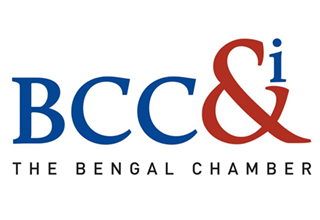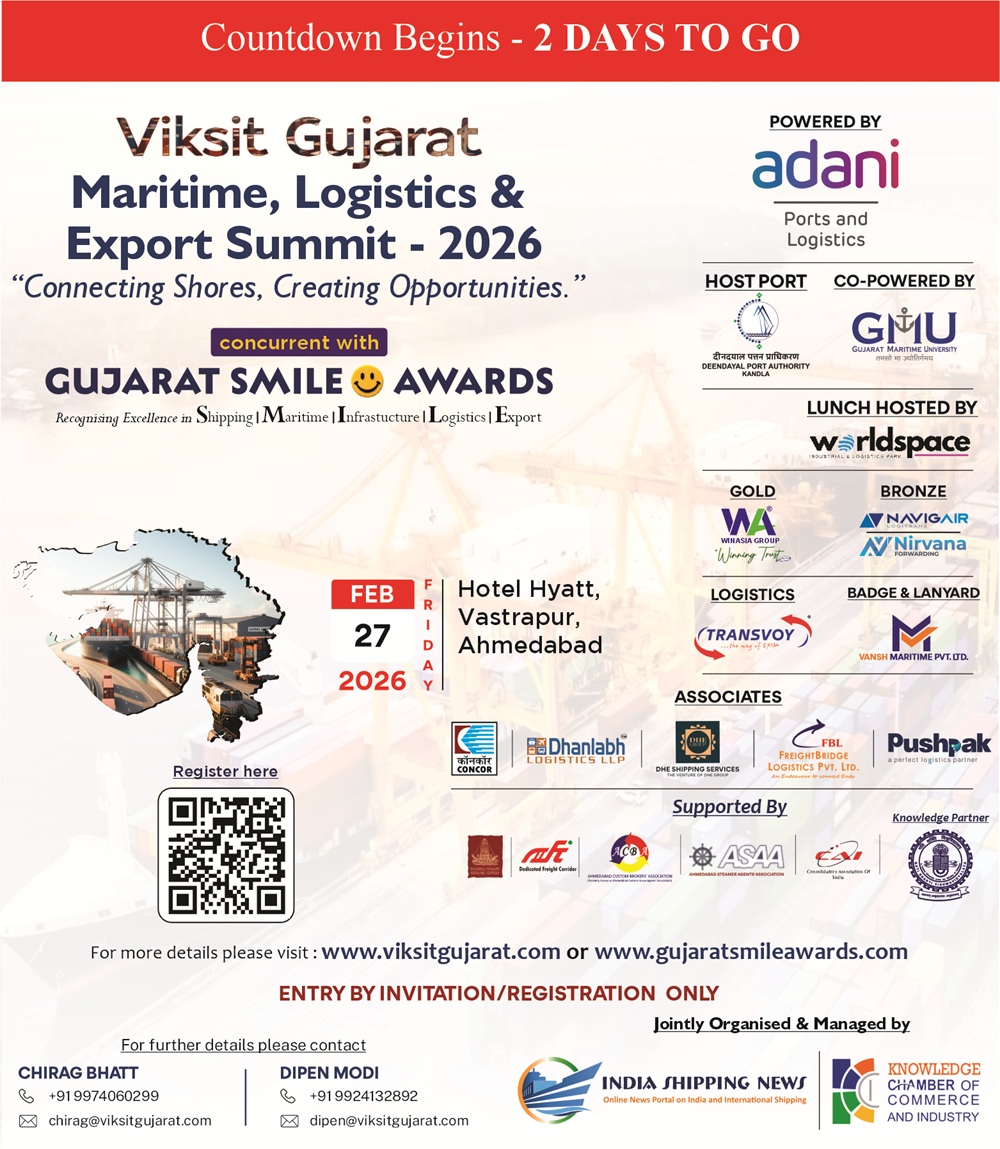
Kolkata– The Hub of Logistics for Bay of Bengal and Gateway to the NorthEast and Neighbouring Countries
BCC&I’s 10th edition of Annual Shipping and Logistics Conclave 2020-21 brings together key stakeholders’The Shipping and Logistics Committee of the Bengal Chamber of Commerce & Industry (BCC&I) organised the 10th edition of its Annual Shipping and Logistics Conclave 2020-21on 4th, 5th and 6th February 2021 on the Cisco Webex platform. The theme of the conclave was “Kolkata – The Hub of Logistics for Bay of Bengal and Gateway to the North East and Neighbouring Countries”. The conclave had the presence of senior representatives from the government, policymakers, industry leaders, researchers, academicians, etc., as per a release
The objective of the three-day conclave was to deliberate on the shipping and logistics sector in the country, particularly in Eastern India, and also cross-border logistics between Eastern India and the neighbouring countries by showcasing the underlying opportunities in the maritime and logistics industry and the challenges being faced by the stakeholders. The aim was that the outcome of the conclave would help in drafting a detailed Plan of Action which would facilitate further developments and growth of the maritime and logistics sector.
The Annual Conclave was inaugurated by the Chief Guest, Mr Mansukh Mandaviya, Minister of State (Independent Charge), Ministry of Ports, Shipping and Waterways (MoPSW) and Chemicals & Fertilizers, Government of India on Day 1 (February 4).

The Minister talked about the present scenario of the maritime trade in the country, with focus on Eastern India. He highlighted the ex-im trade and also the inland water transportation (IWT) network as well as coastal shipping. Especially regarding Eastern India, the Minister focused on the Inland Water Transit Trade (IWTT) protocol route, primarily between India and Bangladesh. He said that the protocol route, connecting various ports of call in Bangladesh like Chittagong, Mongla, etc., would help in the smooth flow of cargo between Eastern India and the North-East via Bangladesh, resulting in reduced logistics cost and lead time.
On Day 2 (February 5), the conclave was addressed by the Chief Guest, Mr Nitin Gadkari, Minister of Road Transport & Highways and MSME, Government of India.
He elaborated on the present scenario of the infrastructure sector in the country, particularly road transportation and highways. He also focused on the ports and shipping sector, highlighting mainly the inland water transportation network and coastal shipping. He called for utilising inland waterways and the coastal routes for transporting cargo, stressing that there should be a balance in the transportation of freight via the waterways and roadways. Presently, 80 per cent of the cargo moves by road, which is creating extra load on land transport. India should make optimal use of water transport as well, he emphasised.
On the last and final day (February 6), the conclave was addressed by the Chief Guest, Mr Vikas Chaube, IAS, Joint Secretary (Logistics), Department of Commerce, Ministry of Commerce and Industry, Government of India.
He focused on the National Logistics Policy (NLP), highlighting the new initiatives, various changes/amendments, etc. to be incorporated in the Policy. Besides, he highlighted the National Logistics Law, Digital Transformation in Logistics and, last but not the least, National Logistics Workforce Strategy which would give a boost to the National Logistics Policy of the Government of India.
The conclave was presided over by Mr S. Hajara, Chairperson, Shipping and Logistics Committee, Bengal Chamber. It was moderated by Capt. S. B. Mazumder, Mentor, Shipping and Logistics Committee, Bengal Chamber; Capt. Ravi Dey, Member, Shipping and Logistics Committee, Bengal Chamber; Mr Dinesh Shastri, Managing Director, TM International Logistics Ltd (TMILL), Kolkata; Mr Ashutosh Jaiswal, Co-Chairperson, Shipping and Logistics Committee, Bengal Chamber; Mr Debashis Dutta, Member, Shipping and Logistics Committee, Bengal Chamber; and Mr Sagar Khastagir, Member, Shipping and Logistics Committee, Bengal Chamber.
The eminent speakers at the conclave were Mr Vinit Kumar, IRSEE, Chairman, Syama Prasad Mookerjee Port (SMP), Kolkata; Dr Amita Prasad, IAS, Chairperson, Inland Waterways Authority of India (IWAI) and Secretary, Government of India, New Delhi; Mr Syed Yasser Haider Rizvi, Additional Managing Director, Summit Alliance Port East Gateway (India) Pvt. Ltd (SAPL) and Alliance Holding Ltd, Bangladesh; Mr Rajesh Gopalakrishnan, General Manager (Strategy & New Projects), Cochin Shipyard Ltd; Capt. Tareque M. Nasrullah, NPP, AFWC, PSC, (Retd) BN, Executive Director, Western Marine Shipyard Ltd, Bangladesh; Commodore Sanjay Deshpande, IN (Retd), Executive Director – Operations (Shipbuilding Division), Titagarh Wagons Ltd, Kolkata; Mr Akhilesh Kumar Srivastava, IAS, Chief General Manager, IT and Commercial Operations, Chief Operating Officer, IHMCL – Tech, National Highways Authority of India (NHAI); Mr S. A. Rahman, IRTS, Chief General Manager, Container Corporation of India (CONCOR), Kolkata; Mr Keku Gazder, Chief Executive Officer, Airports Authority of India (AAI), Cargo Logistics and Allied Services Co. Ltd; Mr Ranjan Sinha, Chief – Group Shipping and Director – Raw Materials Procurement, Tata Steel Europe, Netherlands; Mr Rajan Sharma, Past President, Nepal Freight Forwarders Association (NEFFA) and Consultant Advisor for the Cross-Border Connectivity for the BBIN region, World Bank; and Mr Surajit Sarkar, Chief Operating Officer, NICDC Logistics Data Services Ltd (NLDS) {Formerly known as DMICDC Logistics Data Services Ltd (DLDS)}, Noida, Uttar Pradesh.
The conclave brought together senior government officials, shipping and logistics companies, port users, trade representatives, industry representatives, policymakers, researchers, industry associations, academicians, etc. The total no. of delegates present was 350 approx. The digital engagement of the conclave was: Total viewers 15,000 plus, with total impressions – 10 lakh plus, and engagements – 30,000 plus.
The conclave was an eye-opener for the shipping and logistics industry, comprising bulkers, tankers, ship vetting/inspection, surveyors, vessel scrapping/recycling, port service providers like cargo handling agents, clearing and forwarding agents, Custom House Agents, Custom brokers, logistics service providers, etc. as they got a clear understanding of the business scenario of Eastern India, the trade relations between the East and the neighbouring countries, and also about the possible measures to be taken to further develop the supply chain network of the region.
Overall, the conclave facilitated a way forward for the shipping and logistics sector, which would help them nurture their respective business verticals, leading to improvement in the maritime and logistics business, which in turn would develop economies of scale, said the release.

